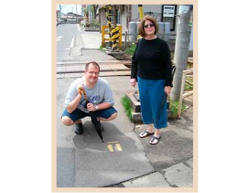
Todd Jay Leonard, Blog


Nearing the end of my "Top Ten List of Things Japanese" is No. 9 - not one singular thing, but various things I am going to classify into one category: attention to detail.
When friends from home visit here, this is one of the first things they notice about Japan and the Japanese: a wonderful respect for the finer points and niceties that help to make daily life that much more pleasant.
Whether it is the nicely uniformed janitorial workers at train stations or the hot towel customers are offered when entering many restaurants and coffee shops (to refresh their faces and wipe their hands) or the way women gingerly tuck under and fold into a triangular shape the top layer of toilet paper on the roll after using it (to make it more attractive for the next person who reaches for it), Japan is a detail-oriented country.
I could go on and on, because there are so many little things that are done regularly in Japan to make whatever experience you are having just that much nicer. Politeness is a well-known trademark of the Japanese, which transfers to all facets of society and daily life. In fact, most of the attention to details I find so intriguing here are rooted in this pervasive sense of politeness as an attempt to make the occasion or situation more comfortable and convenient for others.
Now that I am clearly middle-aged, I am amused at some attention to details that are designed to make life simpler and easier for those of us who are getting older.
In public spaces (such as post offices, government offices, hospitals and banks), items are offered for the aged to utilize while transacting their business. These additional efforts to make a mundane experience more refined show the level of respect that older people in Japan are afforded.
For instance, in many of these establishments, displayed prominently is a selection of prescription eyewear to borrow while conducting the business at hand - in case people either forgot to bring their own or are too vain to wear glasses in public. Normally, there are three types that come in bright red, yellow and blue frames. Each one is distinctly marked with the intended age of the user: For people in their 40s, 50s, 60s and older.
Although the prescription isn't exact for every person that falls within the prescribed age group, it is approximated to the average eyesight of a person around that age. In a pinch, the eyeglasses will suffice momentarily for reading the fine print on a document or seeing to sign one's name.
Fortunately, I have never had to resort to using these, as I wear my own glasses all the time. I do see customers frequently reaching for the glasses to use when trying to conduct business, read small print or fill out a form.
For some reason, eyeglass stores in Japan are very plentiful. In my city alone, I'll bet there are more than 100 shops specializing in eyewear.
One attention to detail that these shops offer to the general public is an electronic cleaning machine that passersby use to clean their eyeglasses while on the run. Outside many of these stores, a table is set up with a sonic-vibrating contraption that uses liquid to clean the lenses and frames completely. Tissues are provided to dry the glasses, as well as an adjustable mirror to make sure they are on straight.
Personal little comforts
Speaking of mirrors, many public places in Japan display mirrors with small advertising on the edges for people to primp and peer at themselves when passing by. This attention to detail serves two purposes: It provides a free service for the general public, while allowing a company to advertise to those people who stop to use it.
Another form of advertising many companies employ is placing staff outside train and bus stations to pass out packets of tissue. It is rather easy for a passerby to immediately throw away a mere piece of paper, but something as useful as tissue is more likely to be placed in a bag or pocket for later use. Each time it is used, the advertisement is noticed.
This is a very clever way to advertise and an attention to detail that is greatly appreciated by people who suddenly find they need tissue ... and fast.
In many public spaces, toilets are readily easy to find, but often these do not provide toilet paper. Usually tissue vending machines are provided so one can purchase a package of tissue in an emergency. However, most people tend to carry the free tissue packets handed to them on the street. This makes it all the more likely that someone given a tissue package will use it eventually.
Actually, a number of service-oriented businesses regularly use a form of advertising that involves a free gift that is useful or needed by the consumer. In the summer, some companies pass out hand fans to commuters in the heat of the day. Again, it is something practical that helps to alleviate the heat, so the person will keep it for another occasion.
I suppose this is not so different from an American real-estate office passing out refrigerator magnets with all the necessary contact information included, or an insurance company that offers pens with the company logo prominently displayed on the side. It just seems so much more prevalent and available in Japan.
Another attention to detail I appreciate here is how passersby who find lost items, such as keys or a dropped handkerchief, will pick it up and place it in a prominent place (high off the ground) so it can be found easily if the person who lost it returns. If a "lost and found" office is available, a Good Samaritan will often return the item so the person who lost it can retrieve it.
Again, this attitude goes back to politeness, and this polite behavior that is such an unshakable part of the Japanese psyche and culture is the oil that keeps the cultural and social machine in good running condition. The attention to details that is so common in Japan makes daily life here seem more civilized. I certainly appreciate all the extras that people and companies do on a regular basis. It just makes for a better quality of life, knowing that someone, somewhere is thinking up yet other new ways to make the ordinary quite extraordinary.
By TODD JAY LEONARD
Columnist
Attention to detail
Human courtesy, respect for others make pleasant the daily life in Japan
Monday, July 30 , 2007







